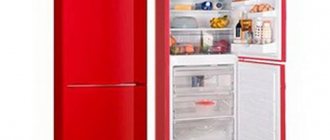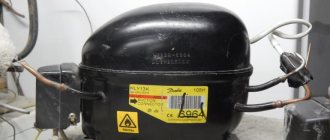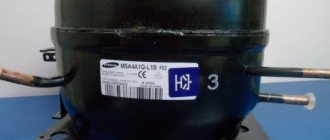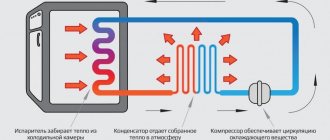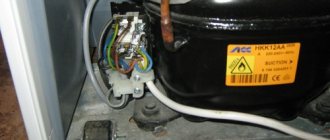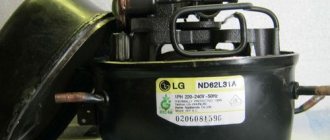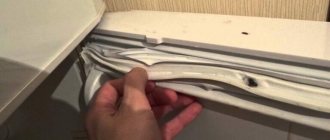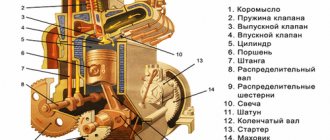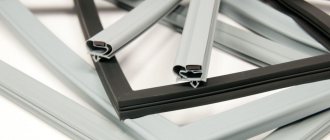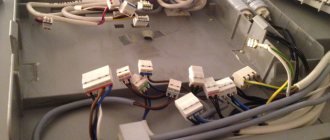The refrigerator is making knocking noises
Each device consists of many large and small parts, elements mounted on a frame or body. The system is dynamic, associated with the circulation of the refrigerant, a high-speed energy unit, the work of the cooler to cool the condenser and compressor, and the fan in the No Frost system. This is why the refrigerator knocks when operating.
Any sounds are amplified in the housing, like in a resonator. You can even hear the crackling of the expanding insulation between the walls. The compressor and fan motors are mounted on shock absorbers, but even they cannot dampen the noise. The manufacturer is obliged to fix everything that knocks loudly in the refrigerator, eliminate the sound amplification and meet sanitary standards - no more than 55 dB - the level of loud conversation. Most modern refrigerators operate with a noise level of no more than 40 dB - a quiet conversation.
Why is the refrigerator knocking?
Each refrigerator mechanism produces characteristic sounds: the murmuring of refrigerant in the tubes, the rustling of fan blades, the sounds of switching from a relay, the noise of a running motor, the knocking of pistons.
There is technological noise, for example, the damper in the Bosch No Frost refrigerator knocks. The reasons for the knocking noise in the refrigerator may be related to defrosting. The fan blades touch the ice. Having heard an increased crackling noise or felt vibration, it is necessary to look for the cause and take action. Perhaps the cabinet is not level, the center of gravity has shifted, or the shelves are overloaded - all this can cause the refrigerator to operate noisily. You should be alert if the device starts knocking louder than usual.
The sounds of “crying” indicate that the refrigerator with the No Frost system has not been cleaned or defrosted for a long time. Ice may crack if there is a lot of ice accumulated in the chamber. The refrigerator whistles and hisses when the fan moves the air intensively. In the silence, you can hear the clicks of the thermostat relay, the pouring and gurgling of refrigerant in the pipes.
The user should be alerted if the refrigerator is knocking loudly and the sound occurs suddenly or increases over time.
How to avoid extraneous noise
In order for the device to operate without unnecessary acoustic accompaniment, you should not ignore the rules of its operation and installation recommendations.
Take the time to check the evenness of the floor under the refrigerator with a level. In advanced cases, it is easier to use a strong base than to try to level the position with legs.
In order for the refrigerator door to close independently using the automatic closer principle, raise the front legs to a height of 1-1.5 cm
Practical tips:
- Determine the correct place for the refrigerator - at least 50 cm away from the radiator, oven and stove. It is also undesirable for direct sunlight from the window to fall on the unit - the body does not need additional heating.
- There must be a gap of at least 10 cm between the wall and the back of the device.
- Do not use the lid of the device as storage for various items and do not try to install a microwave on such a convenient shelf - such “neighbors” significantly reduce the service life of the unit.
- Adjust the internal shelves and drawers to a comfortable height and properly distribute food and containers inside the chambers.
- Do not turn on modes with fast freezing and the lowest possible cooling temperature for a long time, especially in the hot season.
And the last obvious, but so rarely followed advice is to defrost your refrigerator on time, without waiting for heavy snow accumulations and ice.
Why is the refrigerator compressor knocking?
The compressor is the heart of the refrigerator. Its normal operation is accompanied by a low rumbling sound. A knock inevitably occurs at the moment of starting and stopping - the start-protection relay is activated. At the moment of starting, the load on the engine increases several times, so it hums louder until it accelerates. When turned off, a metallic knock is heard - the system calms down. A spring suspension and shock absorber are designed to dampen the noise and vibration of the compressor in the refrigerator.
The refrigerator motor may knock if it has reached the end of its service life, or the seats of the crank or piston system have worn out. The start relay may fail, and then the compressor will turn on for seconds, creating noise.
Refrigerator knocks when turned off
It happens that when the refrigerator is turned off, the compressor knocks loudly and bounces. This fact indicates a weakened shock absorber fastening. You need to move the refrigerator aside and look at the process when the unit stops. He should make an oscillatory movement and hit the body. The sound will be frighteningly loud. It is necessary to secure the motor and move it away from the body.
When the refrigerator is turned off, the knocking may intensify, accompanied by a sharp metallic clang, if the working refrigerant compression mechanism is faulty. In the future, the compressor may jam and the motor will burn out if the thermal protection does not work.
Why does my refrigerator make a loud clanging sound after stopping?
Answer:
The pump and motor components inside the compressor are in an oil bath and mounted on springs to reduce noise. If the refrigerator moves quickly or if the springs age or break, the components move close to the metal frame and may rattle when power is removed from the compressor (low temperature is reached). This makes a metallic clanging or clanking sound.
I have heard this noise many times, but usually in older compressors. The compressor in a sealed unit is mounted on springs held by a nylon block.
Browse products for inventors. Link to the store.
I suspect that with age and use the springs lose some of their tension and the nylon blocks wear out. During operation, torque is applied in one direction, and when power is no longer supplied, the components return to their default position, causing noise.
Source: quora.com
DIY electronics in a Chinese store.
Refrigerator knocking during operation
All refrigerators make noise, but to varying degrees. This depends on the design, layout and material of the models. Some refrigerators are characterized by knocking on the doors, while others are characterized by loud compressor operation.
Users often complain about the Indesit refrigerator. Why does it knock, even when new? The device must be leveled horizontally with a slight tilt back. It is important to comply with the following conditions:
- the distance to walls and other furniture should be at least 5-7 cm;
- provide a stable voltage of 200-220 V;
- remove the transport bolts, tighten the fasteners until they stop, make soft gaskets between the tubes and the body.
The Indesit refrigerator will knock louder in the first days after starting work - the parts are grinding in and the system is getting cold. When installing trays, you need to ensure that the chambers are evenly filled.
Knocking noises from the Indesit refrigerator can be associated with the operation of the thermostat or the start of the relay. Process noise is an inevitable manifestation of device activity.
Ariston refrigerators belong to the same level of budget models, and they have the same problems with Indesit. Knocking, buzzing, and crackling noises are associated with the operation of the cooling system. As long as the noise is within acceptable limits, the refrigerator is working properly.
The Belarusian manufacturer of refrigerators Atlant produces models that occupy high places in the ratings. Thoughtful layout, good build quality, but there is a knock. Compressors with increased noise are used. The device reacts to icing or incorrect installation.
Korean Samsung and LG refrigerators of a higher class use inverter motors that operate continuously. The knocking noise is caused by the operation of No Frost, or by poor alignment when installing or loading cameras. These refrigerators are not much different in design. They have similar problems.
It happens that a Samsung refrigerator clicks, makes loud noises and buzzes. If the device knocks, the problems may be due to violation of operating requirements or a malfunction of any component. If there is any hum, vibration, or loud sound from the refrigerator, you need to check that it is installed correctly. The loud noise must be withstood for a week after switching on - the parts are grinding in and the cold is building up.
If the annoying rumble continues longer than expected, why is the refrigerator knocking, let the Samsung service department sort it out, the refrigerator is under warranty.
Easily eliminated causes of noise
If a knocking sound is heard in a device that has been working faithfully for more than one year, the most likely cause of the repairman is a breakdown of the compressor.
But if we are talking about a new refrigerator, the problem may simply lie in the grinding in of new parts or improper operation of the unit. Therefore, before calling a repair specialist, make sure that you cannot get rid of the noise yourself.
Incorrect installation or operation of the device
The simplest and most common reason why a working refrigerator makes knocking noises and other uncharacteristic sounds is that the base is not level enough.
Even if it visually seems that the device is installed correctly, checking will not hurt, because due to the uneven floor, one of the legs of the unit can only come into contact with the surface, or even just hang in the air. This causes the entire housing to vibrate when the engine is running.
To check the evenness, you can use a horizontal building level by placing it on the “roof” of the unit. A simple plumb line made of strong thread and a small weight, such as a nut, will help you replace the tool.
Almost all modern refrigerators are equipped with height-adjustable threaded feet, with which you can correctly level the appliance
Another source of sound may be the compressor coming into contact with other metal parts when it is skewed.
Tubes that are bent during transportation of the device can also make a knocking noise. In this case, you need to carefully bend the elements or place rubber pads to eliminate contact.
If the refrigerator has been running for a long time and suddenly starts making various noises, first check the temperature inside its chambers. The device freezes properly, and nothing force majeure has been detected other than unusual knocking and rattling?
Perhaps the reason for the increased noise lies in overloaded shelves or the arrangement of the products themselves - pots, jars and other hard containers may touch and knock against each other when starting or turning off the motor.
Try to completely empty the unit of any supplies placed inside it, including items on the roof of the housing. If the noise disappears, the issue is resolved.
The cause of strange sounds when the refrigerator is operating may also be unevenly installed or insufficiently firmly fixed shelves inside the unit - they also need to be checked for horizontal/verticality
But if, during inspection, other problems are discovered, for example, non-working backlight, snow deposits or an obvious “shortfall” in the temperature indicators, most likely it will be necessary to inspect and replace the failed parts.
Loose compressor mount
If the refrigerator has just “moved” to your permanent residence, before turning it on, make sure that the shipping bolts or other fasteners that secure the compressor are removed.
True, not all models provide such protection, so it would be a good idea to look at the instructions and study the recommendations for starting the refrigerator for the first time.
Shipping bolts secure the compressor firmly to the housing so that shaking does not damage the pipeline or refrigerator housing.
If the situation is the opposite - the refrigerator has been working in a constant place for a long time and suddenly began to knock, perhaps the mounting fasteners holding the compressor have become loose, or the rubber gaskets have worn out.
This problem is not uncommon for older models that use springs, and if the compressor is skewed, when turned on/off, its casing will knock on the body, rocking the refrigerator.
Repair measures here are simple - springs should be tightened or replaced, bolts should be tightened, gaskets should be updated.
To make sure that the source of the noise lies precisely in loose fastenings, just put your hand on the running motor, and if the knocking stops, try tightening the mounting screws
To level the position of the suspension, you need to:
- Unscrew the mounting screws and remove the condenser - this is in case it interferes with the inspection of the compressor.
- Check the annular gap between the rubber bushing of the frame and the casing support - it should be uniform.
- If a discrepancy is detected, unscrew the screws securing the springs to the frame half a turn and adjust the degree of their tension to achieve the same clearance around the entire perimeter of the part.
- After this, you can turn on the device, check its position by gently shaking it, and if everything is in order, install the capacitor in its original place.
The knocking sound may appear due to an object stuck behind the condenser tubes located on the back wall of the unit, because many owners use the roof of the device as a convenient shelf for storing all kinds of small things.
Therefore, carefully inspect the elements, and if a foreign element is found, remove it, and at the same time check whether the tubes are in contact with the refrigerator body.
Why does a Bosch refrigerator knock?
Complex household appliances from German brands are considered reliable and are the standard of quality. However, even the best equipment wears out over the years, the metal ages, seats wear out, and backlash appears. Therefore, any refrigerator will start knocking when turned on and during operation.
For a Bosch refrigerator, with electronic control, using new technologies for defrosting and cooling chambers, knocking during operation is divided into technological and emergency. The reasons may be improper operation or wear of parts. For example, if after closing the door of a Bosch refrigerator you can hear knocking inside for some time, you need to pay attention to how the defrosting system works and why the fan blades touch the ice.
The Bosch refrigerator knocks irritatingly and makes other sounds when it breaks down:
- There can be 3 fans in the device, and each has plain bearings. Over the years, the seat wears out and additional noise appears. The knocking occurs when the door opens and closes, because at this time the temperature in the chamber rises and the compressor starts.
- The motor-compressor is faulty. It is necessary to find out which unit needs repair. Perhaps only the bearings need lubrication. A complete replacement of the unit is not excluded.
There is no reason to worry if the Bosch refrigerator knocks quietly, the sound does not increase, the operating mode is not disrupted, and the alarm signal does not light up. The clicking sound can occur from thermal expansion of housing parts and thermal insulation, or from the operation of the thermostat.
But if new knocks, creaks, clicks, or vibrations occur that are not typical for a Bosch refrigerator, you need to contact a repair shop.
Causes of compressor knocking
A knocking sound appears when the compressor operates - this is naturally a sign of a malfunction in your refrigerator. But there may be several reasons.
- Perhaps the cushions (gaskets) on which the unit is attached have simply worn out (or rather lost their elasticity). For new devices this is unlikely, but for old machines it is quite possible.
- The motor bearings are worn out. The most likely reason. But, unlike repairing conventional electric motors, the compressor assembly will have to be replaced. The engine and compressor form a single unit and are located in a sealed housing. The windings are cooled by the working medium of the refrigeration unit. Therefore, its repair is possible only at a company that has specialized tools. It is worth noting that rebuilding a compressor is almost always more expensive than the price of a new one. Therefore, you will have to fork out for a new node.
- Cylinder seals are worn. A compressor works on the same principle as a car engine. True, due to special conditions, wear of the cylinder itself, as well as the sealing rings, is extremely rare. Especially if the refrigerator has not yet reached its guaranteed service life. As in the case of bearings, the motor-compressor assembly will have to be replaced.
- Ingress of dirt, dust or mechanical failure of parts. This happens very rarely, but it can also be eliminated only by replacing the entire unit.
Speakers make noise when turning off refrigerator
Most refrigerators operate in discrete mode - the motor turns on periodically. In apartment wiring, two sockets are often connected on either side of the wall from one network line.
Changes in current parameters when the refrigerator stops in the kitchen are reflected in the operation of electronic equipment in the room. The interference occurs from sparking relay contacts if a connection is noticed between turning off the refrigerator and a knocking sound in the speakers. This is caused by a sharp drop in voltage in the network. The sparking relay only enhances the effect.
The solution is to purchase a filter and switch to another outlet. The relay contacts need to be cleaned, but the voltage drop will remain when the compressor stops.
